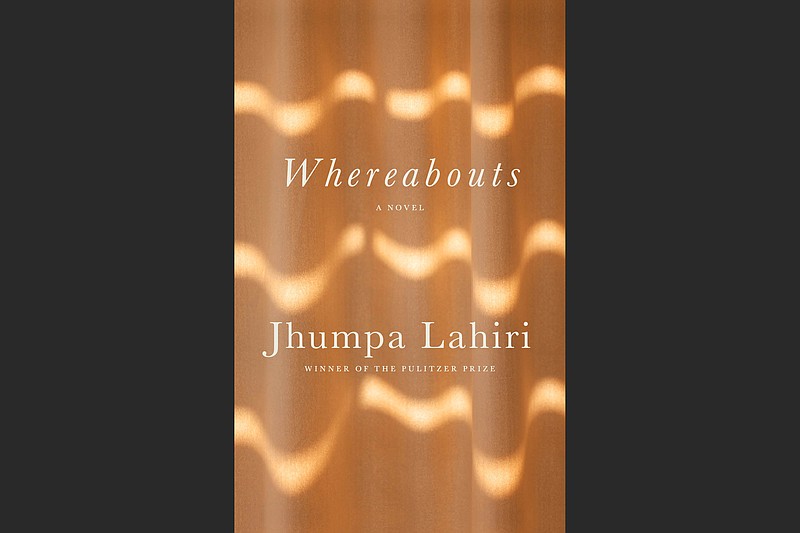I think about people who are alone a lot these days.
I don't mean lonely people, because there are lonely people surrounded by family whose devices ping five times an hour with texts and direct message from "friends." I think about the people who live alone and, especially since the pandemic, have spent most of their time in solitude, looking at screens and sleeping in narrow beds.
I know they are not necessarily lonely, and that some of them have made solitariness a choice.
The unnamed woman at the center of Jhumpa Lahiri's third novel "Whereabouts" (Knopf, $24) seems like such a person. Our information on her is scant — we can glean that she is in her 40s, a writer teaching in an unnamed Italian city, and that she is alone.
There was a man she used to date until his other girlfriend turned up at her door to compare notes, and they figured out they had been running on parallel tracks meant never to converge.
She has friends: a bachelor who likes hosting dinner parties in his home; a female with "an important job that sends her around the world." She drops into our narrator's life now and then for tea and refuge. The friend gives her, for safekeeping, a notebook containing a story written and illustrated by her young daughter. She doesn't want to lose it in the confusion of her busy life. She doesn't want her husband to come across it. She leaves it with the protagonist, in her "spartan place."
There are 46 chapters in "Whereabouts," some of them a page or two long. It is a short novel, 157 pages, that can be read over the course of a night or two. It is written in Italian and translated back in English by Lahiri, who was born in London and grew up in Rhode Island before moving to Italy in 2011.
The book was originally published in Italian in 2018 as "Dove mi trovo," which translates as "Where I find myself," and it represents in some ways a departure from the slow-burning, complex and demanding narratives of her first two novels "The Namesake" (2003) and "The Lowland" (2013).
The Italian title serves as a straightforward description of the book. Each chapter names a place where the narrator finds herself now: On the Sidewalk, At the Museum, In My Head, etc. It has hardly any plot, it takes place roughly over the course of a year, and it ends with the protagonist leaving for — shades of John Denver — "a place I've never been before."
The book is pretty low on narrative, with each of the discrete chapters feeling of a piece within itself. The chapters could stand alone or be reordered in almost any sequence with no harm being done to the whole. You can dip into this book here and there, treat it like a collection of very short essays if you want. It's concerned with the moment, the ongoing now of life and the inescapability of the self.
She is, as people say these days, very much present. In "In the Sun," she orders a sandwich:
It hardly costs anything. I look for a place to sit and find a spot in the playground where they deal drugs at night, but this time of day it's bursting with kids, parents, dogs, also a few people on their own like me. But today I don't feel even slightly alone.
I hear the babble of people as they chatter, on and on. I'm amazed at our impulse to express ourselves, explain ourselves, tell stories to one another. The simple sandwich I always get amazed me, too. As I eat it, my body bakes in the sun that pours down on my neighborhood, each bite, feeling sacred, reminds me that I'm not forsaken.
Lahiri wrote the book in Italian (since 2015, she has written primarily if not exclusively in Italian; her 2016 nonfiction book "In Other Words," about her love affair with the language, is translated into English by Ann Goldstein) as an attempt to make the world strange again, as when an illustrator turns a photograph upside down to copy it.
But translation, even self-translation, must be a tricky thing. The poet Miller Williams was fluent in several languages, including Italian, but maintained that English was the only language that was "haunted" for him, the only one where the connotative shadows huddled behind the words, and so was the only one in which he felt qualified to write poetry.
Perhaps by translating her work back into English, Lahiri is seeking to inject some mystery and music into the prose. Or maybe it's more of a calisthenic exercise, a way of working out using one's self as resistance. In any case, the result is occasionally dislocating, and often thrilling.
The narrator tells us she's never left her city but sometimes feels like a foreigner, a tourist on the earth. Her thoughts are odd and oddly familiar, her impulses recognizably human yet strange. There is a beauty to this book, but it is provisional and transient, a glint off the surface of a wave.
"Solitude: It's become my trade," she thinks, as all the illusions evaporate and we are plunged into this narrator's interior monologue: "[W]hen all is said and done the setting doesn't matter: the space, the walls, the light. It makes no difference whether I'm under a clear blue sky or caught in the rain or swimming in the transparent sea in summer ... disoriented, lost, at sea, at odds, astray, adrift, bewildered, confused, uprooted, turned around. I'm related to these related terms. These words are my abode, my only foothold."
Everywhere the narrator goes, there she is.
Email: pmartin@adgnewsroom.com | blooddirtangels.com
